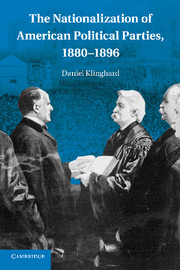Book contents
- Frontmatter
- Contents
- Preface
- Acknowledgments
- Introduction
- 1 Localism and the Jacksonian Mode
- 2 The Nineteenth-Century Associational Explosion and the Challenge to the Jacksonian Mode
- 3 Organizational Transformation and the National Parties
- 4 National Campaign Clubs and the Party-in-the-Electorate
- 5 Grover Cleveland and the Emergence of Presidential Party Leadership
- 6 Party Transformation in the Republican Party
- Conclusion
- Selected Bibliography
- Index
- References
4 - National Campaign Clubs and the Party-in-the-Electorate
Published online by Cambridge University Press: 06 July 2010
- Frontmatter
- Contents
- Preface
- Acknowledgments
- Introduction
- 1 Localism and the Jacksonian Mode
- 2 The Nineteenth-Century Associational Explosion and the Challenge to the Jacksonian Mode
- 3 Organizational Transformation and the National Parties
- 4 National Campaign Clubs and the Party-in-the-Electorate
- 5 Grover Cleveland and the Emergence of Presidential Party Leadership
- 6 Party Transformation in the Republican Party
- Conclusion
- Selected Bibliography
- Index
- References
Summary
As they adapted the methods of the associational explosion to partisan purposes, national party leaders abandoned many of the Jacksonian mode's republican values; in their place, they developed a distinctly national and liberal vision of a party-in-the-electorate attracted to the parties by direct appeals to self-interest. Their ambitions for a national party membership were most clearly demonstrated by the creation of an ambitious, if short-lived, network of party clubs. These clubs were locally based but sponsored by the national committees, and they created a sphere of national party membership that overcame the restrictive geographic boundaries of party regularity. The club plan gave a body to the national committee head; as national chairman and club plan advocate James Clarkson argued, without the clubs, “the National Committee itself has no more organization than if the party did not exist.” The club networks were an accoutrement to the campaign of education; by providing the national organizations with direct access to voters, the club plan enabled them to spread their educational work across a broad swath of society, much as the Farmers' Alliance lecture network allowed that organization to extend its reach in the 1880s. Drawing explicitly on groups such as Moorefield Storey's various reform clubs, this “club plan” intentionally evoked the method and mood of the associational explosion.
The clubs did not last long, but they were a massive undertaking during the 1880s and 1890s, suggesting that any attempt to understand political parties at this transformative moment in their history requires understanding exactly what party leaders thought they were accomplishing with them.
- Type
- Chapter
- Information
- The Nationalization of American Political Parties, 1880–1896 , pp. 124 - 143Publisher: Cambridge University PressPrint publication year: 2010



